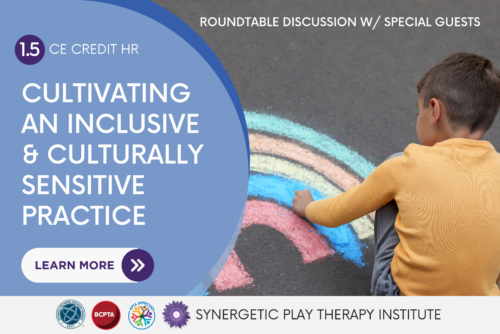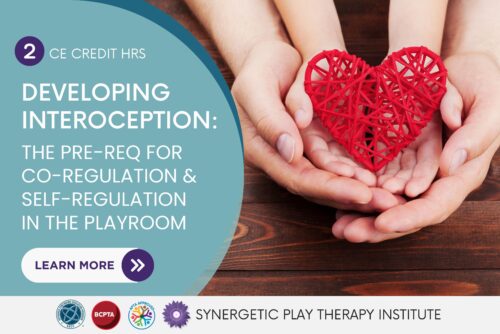Helping children learn how to regulate is essential, but without first strengthening the child's interoceptive sense, regulation may not be successful. This experiential workshop offers various opportunities to explore how play can develop this fundamental part of the sensory system.
As play therapists, there is an understanding that regulation and co-regulation are essential skills that must be developed in order to have successful relationships and manage emotions, and are essential for trauma integration; however, what many play therapists may not fully understand is that there is a prerequisite that needs to be in place for regulation skills to be effective.
What has been understood for years in the world of Occupational Therapy is now becoming a primary focus of education for play therapists. This important understanding is that the child’s interoceptive sense, the 8th sensory system that is responsible for letting the brain know how the body is doing, must be developed first before a child can successfully regulate and co-regulate.
Without the development and strengthening of the interoceptive sense, a child may have all kinds of regulation knowledge and tools but will not be able to read their own body cues to know when to use any of them. Examples such as knowing when to use the bathroom, when to take a deep breath, when to ask for help, the ability to read non-verbal cues, knowing when emotions are feeling overwhelming, etc. all rely on interoception.
This playful workshop is designed to help play therapists learn what the interoceptive sense is and how to use play to develop interoception in their child clients setting the stage for successful regulation and co-regulation. Play therapists will have fun experientially exploring this fundamental part of the sensory system!
(This course is a recording of a 2 hour live webinar held in November 2023)
See course details below.

 This 1.5-hour recorded webinar, in the form of a roundtable discussion, delves into the evolving landscape of diversity, inclusion, and cultural awareness in mental health, exploring how to create a more inclusive and culturally sensitive clinical practice. Led by Lisa Dion, guest panelists Marshall Lyles, Liliana Baylon, and Robert Jason Grant will share their insights and expertise on a range of essential topics, fostering a deeper understanding of the role culture plays in the therapy process, embracing neurodiversity, and creating inclusive play spaces to cater to individual needs. *The course is provided by the Synergetic Play Therapy Foundation. The Synergetic Play Therapy Foundation is dedicated to helping make play therapy trainings accessible and affordable to clinicians worldwide and to funding research initiatives in Synergetic Play Therapy®. The Synergetic Play Therapy Foundation provides scholarships to clinicians seeking post-graduate training in Synergetic Play Therapy® or another play therapy model of their choosing. Scholarships are funded through donations from webinars, donors, and supporters of Play Therapy. By purchasing this course, you are making a direct donation to the Synergetic Play Therapy Foundation. All proceeds will contribute to future scholarships and to the foundation itself! Please scroll down for course details and objectives.
This 1.5-hour recorded webinar, in the form of a roundtable discussion, delves into the evolving landscape of diversity, inclusion, and cultural awareness in mental health, exploring how to create a more inclusive and culturally sensitive clinical practice. Led by Lisa Dion, guest panelists Marshall Lyles, Liliana Baylon, and Robert Jason Grant will share their insights and expertise on a range of essential topics, fostering a deeper understanding of the role culture plays in the therapy process, embracing neurodiversity, and creating inclusive play spaces to cater to individual needs. *The course is provided by the Synergetic Play Therapy Foundation. The Synergetic Play Therapy Foundation is dedicated to helping make play therapy trainings accessible and affordable to clinicians worldwide and to funding research initiatives in Synergetic Play Therapy®. The Synergetic Play Therapy Foundation provides scholarships to clinicians seeking post-graduate training in Synergetic Play Therapy® or another play therapy model of their choosing. Scholarships are funded through donations from webinars, donors, and supporters of Play Therapy. By purchasing this course, you are making a direct donation to the Synergetic Play Therapy Foundation. All proceeds will contribute to future scholarships and to the foundation itself! Please scroll down for course details and objectives. Helping children learn how to regulate is essential, but without first strengthening the child's interoceptive sense, regulation may not be successful. This experiential workshop offers various opportunities to explore how play can develop this fundamental part of the sensory system. As play therapists, there is an understanding that regulation and co-regulation are essential skills that must be developed in order to have successful relationships and manage emotions, and are essential for trauma integration; however, what many play therapists may not fully understand is that there is a prerequisite that needs to be in place for regulation skills to be effective. What has been understood for years in the world of Occupational Therapy is now becoming a primary focus of education for play therapists. This important understanding is that the child’s interoceptive sense, the 8th sensory system that is responsible for letting the brain know how the body is doing, must be developed first before a child can successfully regulate and co-regulate. Without the development and strengthening of the interoceptive sense, a child may have all kinds of regulation knowledge and tools but will not be able to read their own body cues to know when to use any of them. Examples such as knowing when to use the bathroom, when to take a deep breath, when to ask for help, the ability to read non-verbal cues, knowing when emotions are feeling overwhelming, etc. all rely on interoception. This playful workshop is designed to help play therapists learn what the interoceptive sense is and how to use play to develop interoception in their child clients setting the stage for successful regulation and co-regulation. Play therapists will have fun experientially exploring this fundamental part of the sensory system! (This course is a recording of a 2 hour live webinar held in November 2023) See course details below.
Helping children learn how to regulate is essential, but without first strengthening the child's interoceptive sense, regulation may not be successful. This experiential workshop offers various opportunities to explore how play can develop this fundamental part of the sensory system. As play therapists, there is an understanding that regulation and co-regulation are essential skills that must be developed in order to have successful relationships and manage emotions, and are essential for trauma integration; however, what many play therapists may not fully understand is that there is a prerequisite that needs to be in place for regulation skills to be effective. What has been understood for years in the world of Occupational Therapy is now becoming a primary focus of education for play therapists. This important understanding is that the child’s interoceptive sense, the 8th sensory system that is responsible for letting the brain know how the body is doing, must be developed first before a child can successfully regulate and co-regulate. Without the development and strengthening of the interoceptive sense, a child may have all kinds of regulation knowledge and tools but will not be able to read their own body cues to know when to use any of them. Examples such as knowing when to use the bathroom, when to take a deep breath, when to ask for help, the ability to read non-verbal cues, knowing when emotions are feeling overwhelming, etc. all rely on interoception. This playful workshop is designed to help play therapists learn what the interoceptive sense is and how to use play to develop interoception in their child clients setting the stage for successful regulation and co-regulation. Play therapists will have fun experientially exploring this fundamental part of the sensory system! (This course is a recording of a 2 hour live webinar held in November 2023) See course details below.
